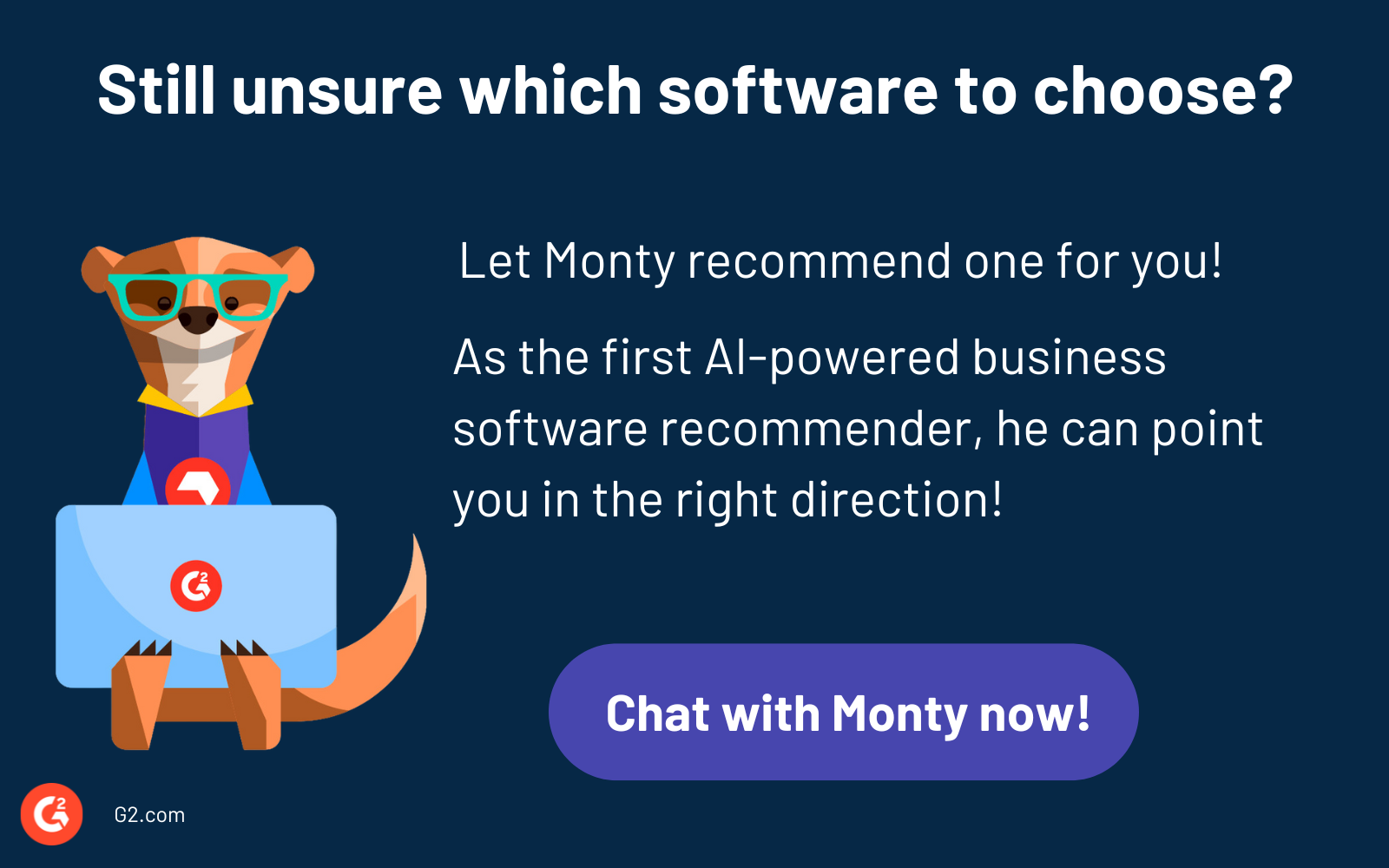Choosing the best CRM software can feel overwhelming. With countless options on the market, it’s easy to get lost in features, pricing models, and promises.
I’ve spent years working with sales and marketing teams, seeing firsthand what works and what doesn’t when it comes to managing customer relationships. Sitting with sales reps during their meetings taught me about their frustration with clunky software and deals falling apart because critical follow-ups slipped through the cracks. I’ve also seen my sales colleagues lose valuable time troubleshooting CRMs that were not designed to meet their needs.
A clunky or overly complicated CRM slows down your team and impacts your bottom line. The best CRM software acts as an extension of your sales process—empowering reps with insights, automating repetitive tasks, and enabling them to focus on what matters the most: building relationships and closing deals.
To help businesses avoid the missteps I’ve encountered in the past, I've partnered with sales professionals and Blue Bowen, our resident expert on CRM solutions, to assess 30+ CRM solutions based on real-world sales needs: usability, automation capabilities, scalability, reporting, and integration with email and marketing software. I’ve also analyzed G2 reviews to get a clearer picture of what real CRM users value most. These insights helped me understand the common pain points users face, ensuring the CRM recommendations below align with your business needs.
10 best CRM software of 2025: My top picks
-
Salesforce Sales Cloud: Best for customizable CRMs with built-in AI tools
for scaling teams, offering customization and Einstein AI features. ($25/mo) -
HubSpot Sales Hub: Best for email tracking and sales automation
For robust email tracking, calling, and automation features. ($45/mo) -
ActiveCampaign: Best for email marketing with CRM and automation
For personalized sales outreach, lead scoring, and segmentation. ($15/mo) -
ClickUp: Best for combining CRM tasks with project management
For one place to track deals, client activity, and team collaboration. ($7/mo) -
Close: Best for all-in-one CRM with built-in calling, email, and SMS
For combining CRM with native dialer, email, SMS, and real-time reporting. ($49/mo) -
SAP Sales Cloud: Best for integrating sales automation with customer data
For enabling automation, intelligent lead management, and pipeline visibility.(Available on request) -
Pipedrive: Best for visual pipeline management and sales simplicity
For drag and drop pipelines, automation, and activity tracking for SMBs ($12/mo) -
Bigin by Zoho CRM: Best for affordable, pipeline-centric sales management
For simple pipeline views, basic automation, and easy onboarding. ($7/mo) -
Thryv: Best for all-in-one CRM with scheduling and payment tools
For CRM, online scheduling, marketing automation, and payment processing. ($228/mo) -
Monday CRM: Best for managing sales from prospecting to post-sale
For managing sales workflows, pre-sales pipelines, and account management. ($12/mo)
*These collaboration tools are top-rated in their category, according to G2 Grid Reports. I’ve also added their monthly pricing to make comparisons easier for you.
10 best CRM software for 2025: My top picks
A CRM helps you store customer contact details, manage the sales pipeline, gain insights into sales forecasting trends, and automate repetitive tasks like sending follow-up reminders. CRM tools let you share notes on customer interactions, so you can collaborate better with account executives, BDRs, and customer success teams.
According to Grand View Research, the global customer relationship management size was valued at USD 73.40 billion in 2024 and is projected to reach USD 163.16 billion by 2030, growing at a CAGR of 14.6% from 2025 to 2030.
How did we find and evaluate the best CRM software?
I spent weeks working with our in-house CRM experts and sales teams to really get to the bottom of what CRM tools can do. My goal was simple: figure out what they’re great at, where they fall short, and whether they’re worth your time. I also sifted through countless user reviews on G2 to gather and analyze feedback straight from the people who use CRMs every day. To top it off, I used G2’s Grid Reports to see how these tools stack up against each other and pulled together this list of the best CRMs just for you.
Best CRM software goes one step further by letting you access customer data, performance metrics, and sales pipeline from a single dashboard. I’m all about tools that make life easier, so I love it when CRM systems include automation for managing leads and running email campaigns. Plus, they integrate with analytics tools and calendars. And some also offer AI-powered insights to help you stay on top of high-value leads and sales KPIs.
82%
of B2B decision makers think sales reps are unprepared to effectively engage with customers.
Source: Sales Lion
What I believe sets the best CRM software apart
The importance of CRM features depends on the role of end users and their daily tasks. Here's what I think sets the best CRMs apart from the rest. These are also the criteria based on which we evaluated the CRM solutions.
- Intuitive user interface: Ease of use is an absolute must for any software, no doubt about it. Working with the sales and marketing teams has shown me just how much different teams rely on their own set of metrics. If a CRM isn’t easy to use, they won’t be able to create role-specific dashboards with the key metrics and tasks they need. Plus, I know my sales teammates would love using drag-and-drop Kanban boards to visualize their deals, but they can't do so if the CRM isn’t easy to use.
- Task and activity management: If you’re anything like me, you love task management software for how easily it keeps you on top of to-dos and deadlines. It’s the same with CRMs—I’ve noticed a lot of users prefer automatic task creation triggered by events like deal stage changes or lead inquiries. From what I’ve seen, they also really appreciate activity timelines that give a clear, chronological view of all interactions.
- Reporting and analytics: I’ve noticed my sales peers are big fans of custom report builders. They love real-time dashboards for tracking the latest metrics on sales pipelines, campaign performance, and support tickets. Plus, based on my research and G2 review data, CRM users today prefer tools with predictive analytics to forecast trends, spot churn risks, and suggest the next best steps.
- Integrated communication tools: Having spent a good amount of time with sales and marketing teams, I know the last thing they want is to bounce between tools before or after client meetings. That’s why it’s crucial for your CRM to have shared inbox capabilities and automatically log interactions—whether it’s emails, calls, or messages—and link them to the right accounts.
- Integration: I know for a fact that CRM users, myself included, love having solid integration options. Native integrations offer out-of-the-box connections to tools like marketing platforms, ERPs, accounting software, and customer support systems. Plus, you may also want API access in case you're building custom integrations for unique business needs.
- Advanced automation: CRM software with advanced workflow builders makes it easy to set up time-based triggers, like automatically sending follow-up emails after a demo. I’ve also seen my sales teammates get excited about event-driven automation, where things like form submissions or customer interactions trigger real-time responses.
Over the past few weeks, I've evaluated over 30+ CRM tools, and the 10 that made the cut really stood out. They impressed me with how easy they are to use, their ability to automate sales processes, deliver data-driven insights, and handle task management.
To be included in the CRM software category, a product must:
- Offer a set of sales-focused tools
- Manage leads, contacts, accounts, and opportunities effortlessly
- Capture and store all sales activities and interactions in one place
- Combine customer history and transactions into a single, easy-to-use interface
- Track prospects and contacts as they move through the sales pipeline
- Support communication at every stage of the customer lifecycle
- Provide reporting tools to monitor and improve sales performance
- Streamline processes with workflow automation features
- Bring everything together on one unified database and platform
Want to learn more about CRM Software? Explore CRM products.
1. Salesforce Sales Cloud: Best for customizable CRMs with built-in AI tools
I’ve consistently received strong feedback on Salesforce Sales Cloud's comprehensive CRM capabilities.
Users highlight its ability to manage leads, contacts, and opportunities seamlessly, while also appreciating the advanced reporting tools and real-time dashboards that support data-driven decision-making.
As a category leader on G2 based on 20423+ verified reviews, Salesforce Sales Cloud has achieved a stellar customer satisfaction score of 99, with a 72% average adoption rate and a 15-month estimated ROI payback.
What stands out across many reviews is the platform’s high level of customization and scalability. I’ve read that businesses can adapt Salesforce to suit their unique workflows and that it scales effectively as teams grow. The integration capabilities are another major plus—users frequently mention how well it connects with marketing automation tools, accounting software, and customer support platforms.
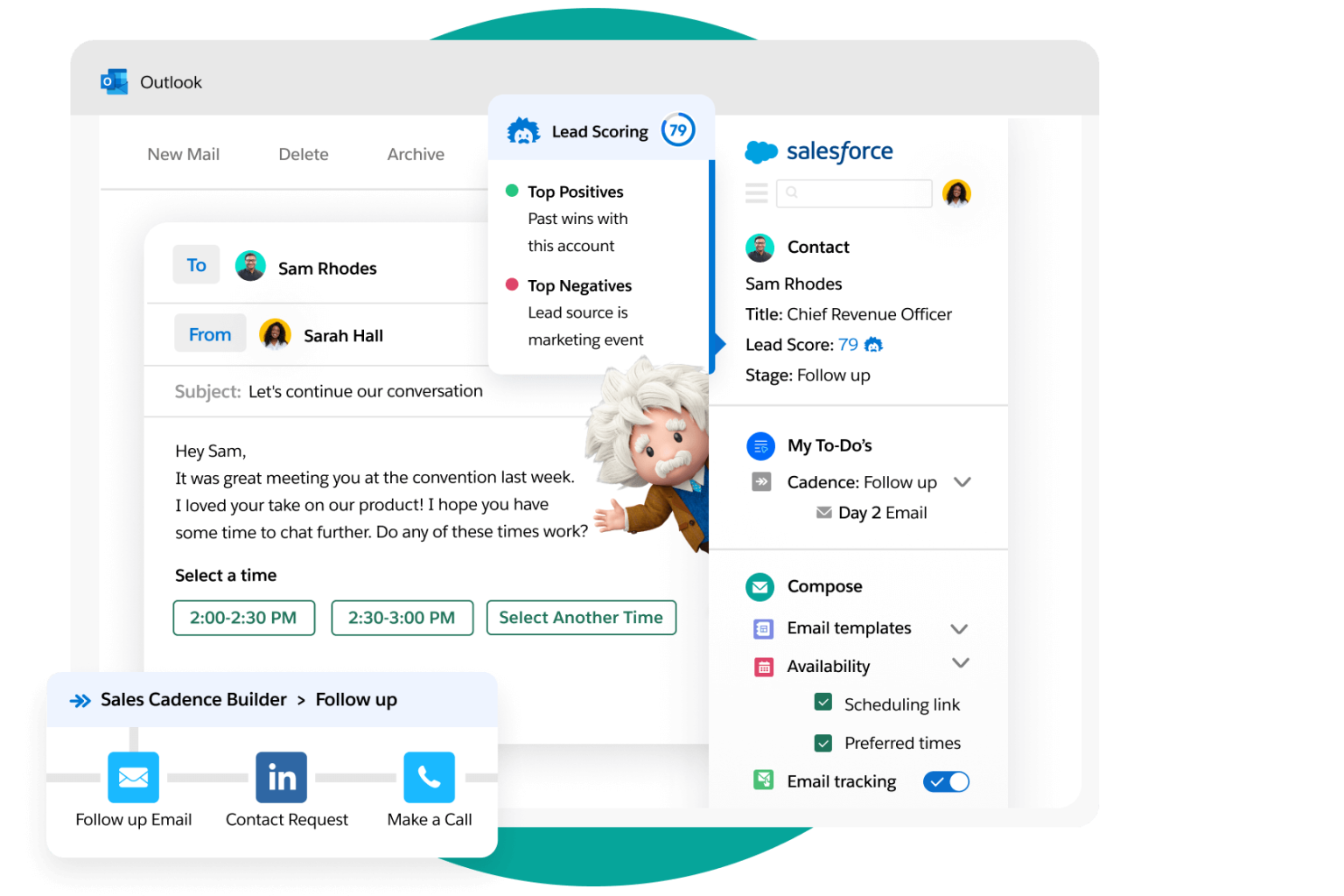
According to G2 user reviews, Salesforce Sales Cloud is admired for its depth and flexibility, though its feature set can feel overwhelming at first. New CRM users often mention that while customization is powerful, it may require technical expertise, which can slow down implementation if internal resources are limited.
Another theme in G2 feedback is around pricing and performance. Advanced features can make the platform costly for smaller businesses, and a few reviewers note occasional slowdowns when managing very large datasets.
Overall, G2 sentiment emphasizes that Salesforce Sales Cloud delivers unmatched CRM capabilities, with critiques mostly centered on onboarding complexity, pricing, and scale performance rather than its core strengths.
What I like about Salesforce Sales Cloud:
- I frequently see G2 reviewers highlight the centralized dashboard for managing leads, contacts, accounts, and opportunities as a major convenience.
- From what I’ve seen, there is a great appreciation for Salesforce’s broad range of integrations that help streamline workflows across platforms.
What G2 users like about Salesforce Sales Cloud:
“Customizable dashboards by user role are one of my favorites. I also love the ability to create subscribed reports that go out to stakeholders on a cadence. A huge plus is the number of integrated tools.”
- Salesforce Sales Cloud Review, Steven T.
What I dislike about Salesforce Sales Cloud:
- While the integration capabilities are powerful, multiple G2 reviewers have mentioned struggles with achieving the desired setup without technical expertise.
- I’ve noticed that G2 users often express concern over pricing, especially for smaller businesses, as costs tend to rise with added features and users.
What G2 users dislike about Salesforce Sales Cloud:
“The new Salesforce Lightning version has so many click-throughs and is generally slower. It takes a lot of time to hover over links to reveal key data items you need to see, or worse, having to open multiple browser tabs to see more detailed account/opportunity information.
There's so much data they are trying to show or link to on a page. Still, I find that most important data is buried or hidden behind ‘view more/all’ links or shown in the pop-up windows, so I constantly have to dig deeper to find what I need and often get lost in dozens of browser tabs.”
- Salesforce Sales Cloud Review, Ted G.
Need help with sales enablement? Check out how to create a sales enablement strategy and the software that can help you.
2. HubSpot Sales Hub: Best for email tracking and sales automation
I’ve come across a lot of positive feedback about HubSpot Sales Hub, particularly around its user-friendly design and productivity-focused tools.
As a category leader on G2 based on 9918+ verified reviews, HubSpot Sales Hub has received an excellent customer satisfaction score of 99, with a 71% average user adoption rate and a 12-month estimated ROI payback.
One standout feature that users frequently mention is the Prospecting Workspace. It brings daily sales activities into one centralized view, which many say helps them stay organized and avoid the distraction of switching between tools.
Another feature that consistently gets praise is the Meeting Scheduler. I’ve read that its seamless calendar integration makes it easy for prospects to book time, reducing the need for back-and-forth emails. The Sequences functionality is also well-received—it allows for automated, personalized follow-ups that maintain a human touch, which users find valuable for nurturing leads efficiently.
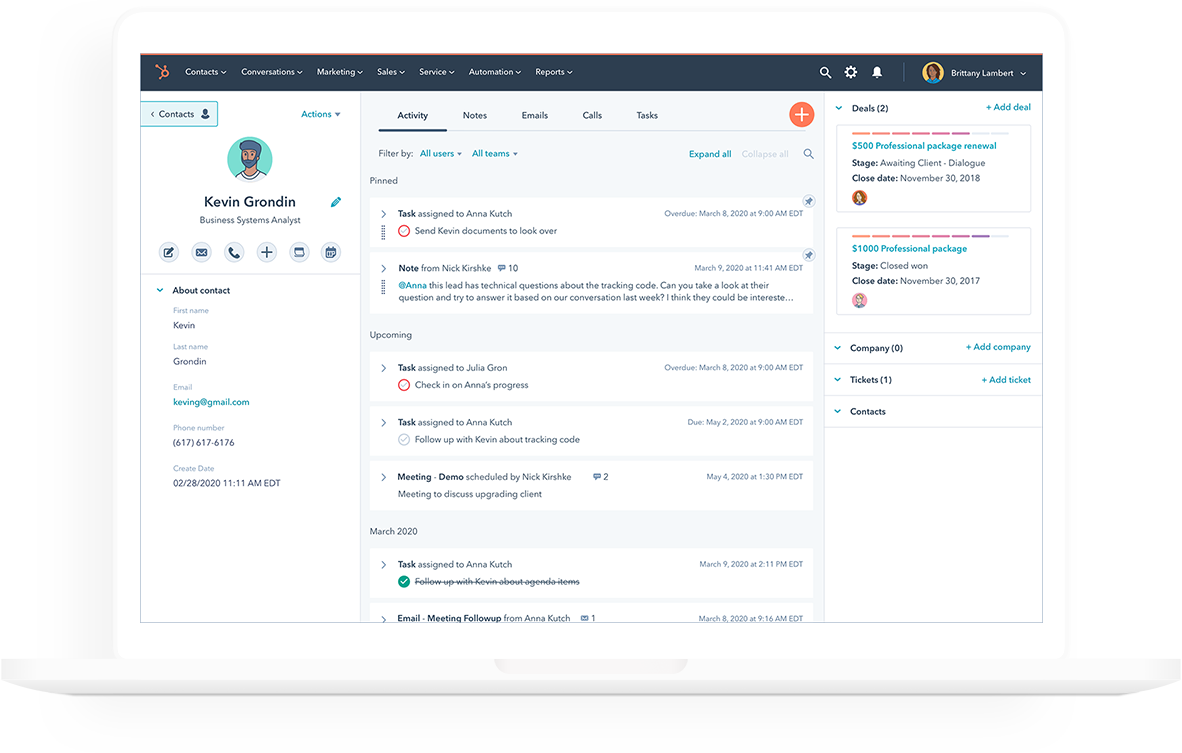
According to G2 user reviews, HubSpot Sales Hub is appreciated for its approachable design, though some of the more advanced tools can feel a little daunting at first. A few reviewers also mention that customization is limited in the free or entry-level tiers, which may restrict flexibility as teams grow.
Another theme in G2 feedback relates to contact management. While the platform works well for most sales needs, some users feel its contact management capabilities could be more robust compared to larger enterprise CRMs.
Overall, G2 sentiment highlights HubSpot Sales Hub as a user-friendly and effective CRM, with critiques centered on advanced feature complexity, entry-level customization, and contact management depth rather than its overall usability.
What I like about HubSpot Sales Hub:
- I've noticed a consistent theme in G2 reviews: how intuitive and easy to use the tool feels, which I also found commonly appreciated.
- One feature that I see getting a lot of praise is Sequences, which helps teams send automated, personalized follow-ups efficiently.
What G2 users like about HubSpot Sales Hub:
“HubSpot Sales Hub is a great tool for streamlining and organizing the sales process. It’s user-friendly and offers many features, including email tracking, call logging, and lead management. The integration with other HubSpot tools, such as Marketing and Service Hub, allows for seamless communication and data transfer between teams. The reporting and analytics capabilities are also very helpful for checking sales performance.”
- HubSpot Sales Hub Review, Aivaras B.
What I dislike about HubSpot Sales Hub:
- Based on my review of G2 feedback, customization options can feel limited—particularly for businesses on lower-tier plans.
- I’ve come across noticeable dissatisfaction around the contact management system, with users finding it less effective for handling complex relationships.
What users dislike:
"My main complaint is Line Items as a second-class object, I need access controls and workflow functionality. CPQ launch doesn’t address my specific concerns but was definitely a need for many."
- HubSpot Sales Hub Review, Chris M.
3. ActiveCampaign: Best for email marketing with CRM and automation
From what I’ve seen, ActiveCampaign earns praise for effectively blending CRM functionality with robust marketing automation.
According to 3720+ verified G2 reviews, ActiveCampaign has received a customer satisfaction score of 95, making it a category leader on G2. Further, the average user adoption for the overall segment is 71%, with an 11-month estimated ROI payback.
Many users appreciate how the platform streamlines customer relationship management while enabling complex, dynamic workflows that make personalized engagement easier and more efficient.
I’ve read that one of its biggest strengths is ease of use—after the initial learning curve, teams often find it intuitive to manage customer lists and launch campaigns. The wide range of integration options also stands out. Whether connecting to eCommerce platforms like Shopify and WooCommerce or other business tools, users note that the process is smooth and reliable.
The platform’s customer-centric approach also receives frequent mention. I’ve come across positive feedback about ActiveCampaign’s responsive and helpful support team, which plays a big role in reducing downtime during troubleshooting. In addition, its segmentation and behavioral targeting tools are highly valued for enabling personalized campaigns that resonate with different audiences.
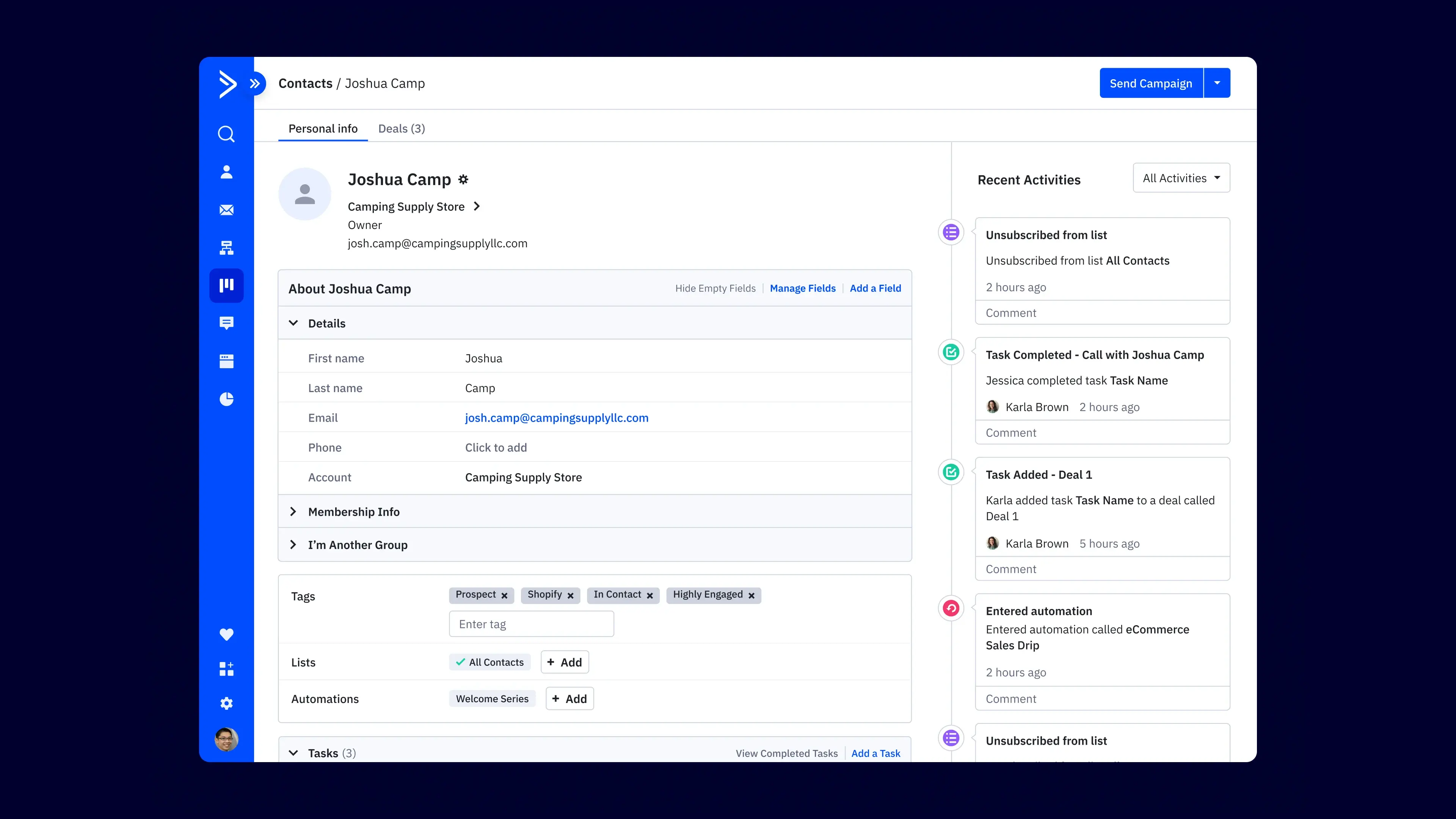
According to G2 user reviews, ActiveCampaign is praised for its automation capabilities, though the email template editor is sometimes described as a bit clunky. Users mention that design flexibility is limited, which can make building polished emails slightly more time-consuming.
Another theme in G2 feedback is around complexity and pricing. While the platform offers powerful advanced features, some reviewers note that they can feel overwhelming without consulting the help documentation. Others mention that costs rise quickly as businesses expand their feature needs, which can be challenging for smaller teams.
Overall, G2 sentiment reflects ActiveCampaign as a feature-rich platform that delivers strong marketing automation and CRM value, even if usability and pricing require some consideration
What I like about ActiveCampaign:
- I frequently see G2 reviewers highlight the dynamic workflow creation feature, which saves time and boosts efficiency—something I also find notably valuable.
- From what I’ve seen, users really appreciate ActiveCampaign’s seamless integrations with a wide range of tools, which help streamline their processes.
What G2 users like about ActiveCampaign:
"I love ActiveCampaign. We switched from a much more difficult and confusing software a couple of months ago. It was not an easy migration because we had so many automations to move, but ActiveCampaign's customer support is top-notch. Almost every time I've needed them, they have blown me away with their responsiveness and willingness to get to the bottom of the problem. That, combined with the workshop, made our migration as smooth as it possibly could be.I am very impressed with the software's capabilities, too. It is so much easier to use than our previous one, and I find myself looking forward to getting in there and seeing what's going on instead of dreading it. Our sales team uses the CRM every day and is very happy with it, as well."
- ActiveCampaign Review, Kelley B.
What I dislike about ActiveCampaign:
- I’ve noticed users mention that the email editor can feel a bit clunky, making it harder to create and customize emails smoothly.
- Negative feedback tends to focus on pricing, with many users noting that it can be a challenge for smaller businesses, especially as costs increase with additional features.
What G2 users dislike about ActiveCampaign:
"I dislike the pricing model. It almost feels like we are penalized for growing our database because the more people in there, the more expensive it gets. I also don't know that I feel that it's incredibly intuitive. I spend a lot of time learning how to do things by reading articles in the Support section. I'm usually able to figure it out, but I wish it were more intuitive."
- ActiveCampaign Review, Karin C.
Creating a sales playbook? Learn how to maximize the value of a sales playbook.
4. ClickUp: Best for combining CRM tasks with project management
I’ve come across a lot of positive feedback on ClickUp as a versatile, feature-rich CRM and productivity tool.
Based on 1500+ reviews, ClickUp has earned a market presence score of 84. 94% of users are likely to recommend it to others, and 98% of users rate it 4 or 5 stars.
Users frequently highlight its flexibility in managing tasks and tasks, making it a strong choice for teams with diverse working styles and needs.
One of the most commonly praised aspects is ClickUp’s customizable interface. I’ve read that features like tags, custom fields, and multiple view options—such as Kanban boards, lists, calendars, and timelines—make it easy for teams to tailor their workspace. The ability to switch between views is a particular favorite among users, especially when team members prefer different formats. Integrations with tools like Slack and Google Drive also come up often, allowing for smooth communication and file sharing.
ClickUp also gets credit for helping users consolidate their work. By combining tasks, documents, reminders, and automation in one place, many teams have found it easier to stay organized without needing multiple tools. Features like task dependencies and workflow automation are often mentioned for giving a clearer view of project progress and resource allocation. For small teams, the free tier and cost-effective premium plans are seen as a big advantage.
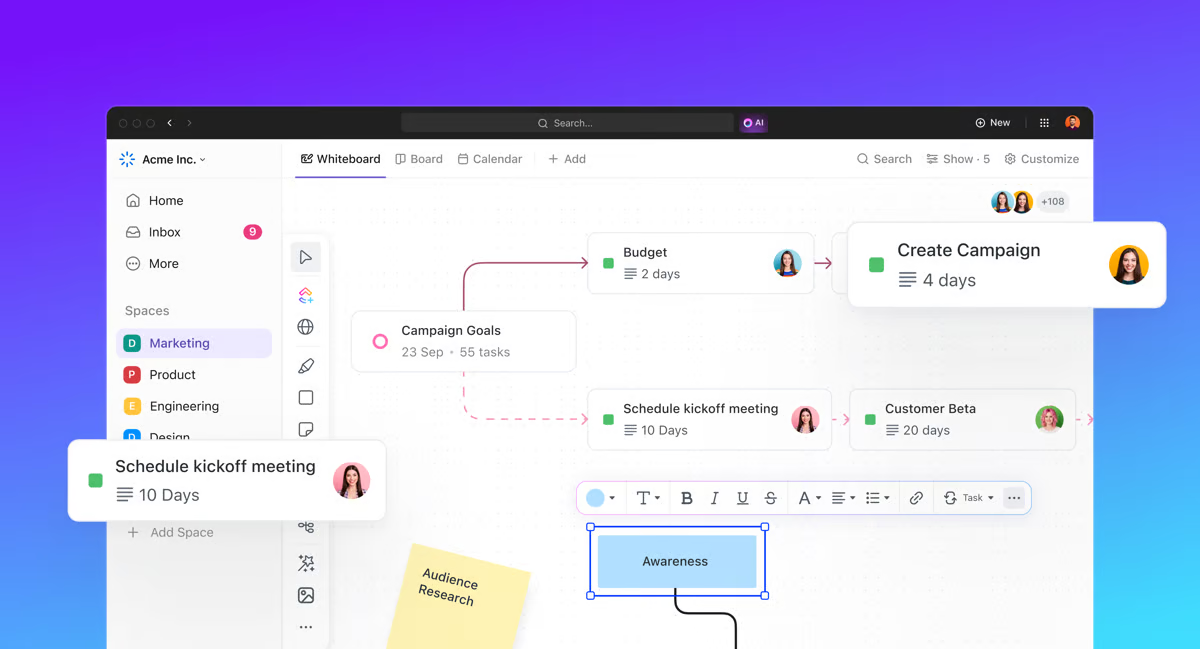
According to G2 user reviews, ClickUp is admired for its versatility, though the initial setup can feel overwhelming. With such a wide feature set, some teams mention a learning curve in tailoring the platform to their specific workflows.
Another theme in G2 feedback relates to performance and stability. Occasional lags, bugs, and delayed notifications are noted, particularly in larger projects. A few reviewers also suggest that while frequent updates add new functionality, more focus on refining existing features would further improve reliability.
Overall, G2 sentiment reflects ClickUp as a robust all-in-one productivity tool that continues to deliver strong value despite some setup and performance challenges.
What I like about ClickUp:
- According to users, one standout capability is how ClickUp combines tasks, documents, and reminders into one platform, simplifying workflow management.
- Something G2 reviewers seem to really appreciate is the ability to tailor workflows with tags, custom fields, and multiple views like Kanban, list, calendar, and timeline.
What G2 users like about ClickUp:
"At RecRam, ClickUp has become an essential tool for managing error tracking, team communication, and task follow-ups. Its visually appealing interface and simplicity make it a joy to use, while its speed ensures efficiency in daily operations.The platform excels at providing a clear overview of tasks and progress, keeping everyone on the same page. Whether it’s tracking bugs, coordinating between teams, or following up on deliverables, ClickUp makes everything intuitive and organized.
ClickUp’s flexibility and visually dynamic design have elevated our workflow, making complex processes easier to manage. Highly recommend it for teams that value efficiency and clarity."
- ClickUp Review, Nebi K.
What I dislike about ClickUp:
- I’ve come across multiple G2 reviews mentioning that it takes time to fully understand the vast number of features, which can be overwhelming for new users.
- I’ve noticed some G2 reviewers express frustration with occasional lags, bugs, and delayed notifications, which can disrupt workflows and impact user experience.
What G2 users dislike about ClickUp:
"In some cases, preparing our entire work team may be a little slow, due to the large number of functions and customization options that can be overwhelming for new users, requiring training time.
It may be that working on many tasks and projects simultaneously causes us to feel a little slow, but I think it does not affect the team's efficiency.
Although the free version is robust, certain advanced features can be expensive compared to other tools.
On the other hand, the interface could sometimes look complex compared to the structure of similar platforms, making it difficult to navigate large projects quickly."
- ClickUp Review, Jose R.
5. Close: Best for all-in-one CRM with built-in calling, email, and SMS
While exploring Close, I noticed it’s often praised for its simplicity and ease of use, particularly for small to mid-sized sales teams. The interface is clean and intuitive, making daily operations straightforward even for those new to CRM tools.
Based on 1583 verified G2 reviews, Close has achieved a stellar customer satisfaction score of 99, with 94% users willing to recommend it to others for lead management, performance, reliability, and desktop integration.
One of the standout features I’ve come across is the integrated calling and email functionality. Users appreciate being able to manage all communications directly within the platform, streamlining workflows without needing to switch between tools. Smart Views—customizable, real-time mini-reports—also receive positive mentions for offering quick insights into lead activity and sales progress. Additionally, the bulk editing capability is valued for making it easy to update multiple records efficiently.
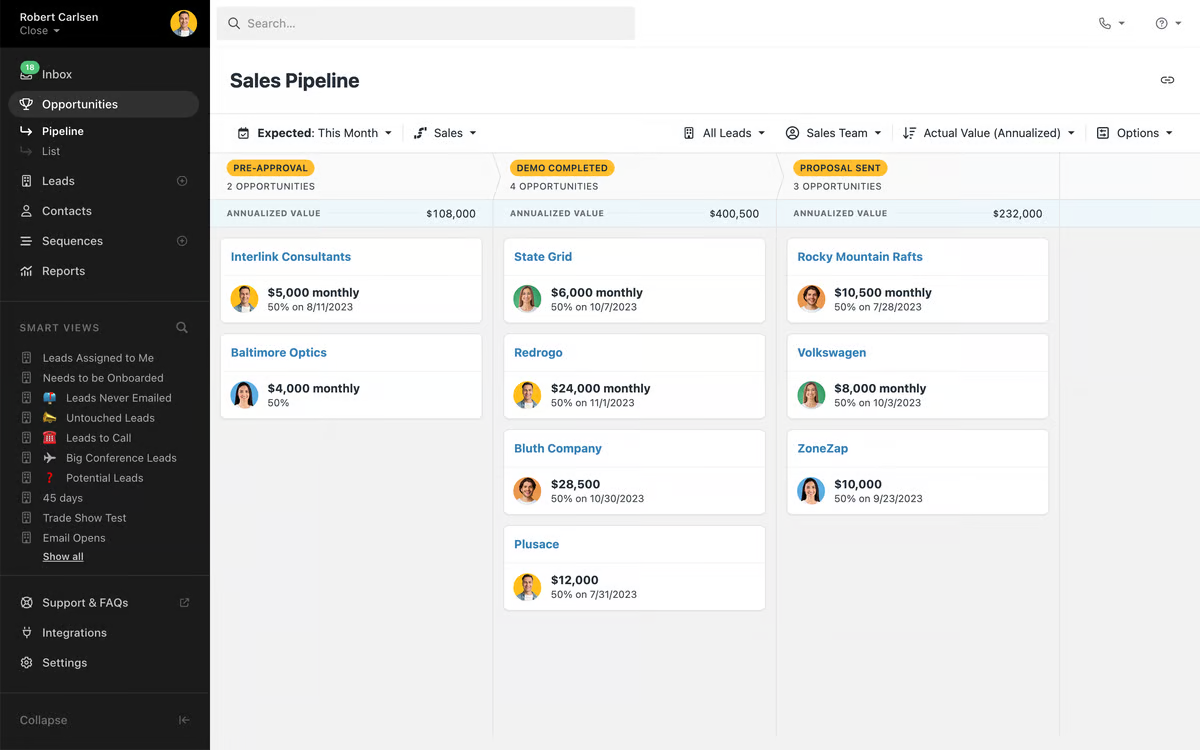
According to G2 user reviews, Close is appreciated for its simplicity and sales-focused design, though some note limitations as operations scale. Automation and reporting tools aren’t as advanced as competitors, which can create challenges for larger teams with more complex needs.
Another recurring theme in G2 feedback is around pricing and support. Reviewers mention limited flexibility in plans and some frustration over unexpected increases. Customer support generally handles basic queries well, but technical issues and data imports—especially with custom fields—can take longer to resolve.
Overall, G2 sentiment reflects Close as a straightforward, user-friendly CRM that works especially well for lean sales teams, even if scaling and advanced customization may require trade-offs.
What I like about Close:
- An intuitive design is a commonly appreciated element, simplifying daily sales operations and making the tool easy to navigate.
- One feature that I see getting a lot of praise is how Close allows sales teams to handle calls and emails directly within the CRM, streamlining communication.
What G2 users like about Close:
“It's the ease of use and having the most important data at a glance. The logical layout of the overview. Very good assistance, such as when creating templates.
In our call center, we use Close as a CRM for multiple clients. We spend hours daily with this simple system. New employees can start working with Close within minutes. If something doesn't work or a feature is missing, the support team is very helpful and quick to assist. Useful suggestions are implemented promptly. Adding new customers is very quick and requires no extensive background knowledge. This is due to the logical structure of the CRM."
- Close Review, Stephan U.
What I dislike about Close:
- Based on my review of G2 feedback, Close lacks comprehensive reporting and robust automation capabilities, which some users find limiting.
- I’ve seen multiple G2 reviewers mention frustration with the inflexible pricing structure and occasional unexpected price hikes, especially for businesses on a budget.
What G2 users dislike about Close:
“I would really like the ability to use my Close number to send as an iMessage. Nearly all of our clients have iPhones, and sending green texts looks bad and makes people think you're not texting a real person. And that person-to-person connection with our clients is super important.
Also, I'd really like more functionality on triggers for workflows. It seems pretty basic, and a lot of what we're trying to automate can't be done only in Close with the current native triggers. We have to integrate other services to get it to do what we want."
- Close Review, Nate E.
Can't engage with prospects and buyers effectively? Check out how sales readiness can help.
6. SAP Sales Cloud: Best for integrating sales automation with customer data
From what I’ve seen, SAP Sales Cloud is a robust CRM solution designed for organizations managing complex, end-to-end sales processes.
Based on 733+ verified G2 reviews, SAP Sales Cloud has achieved a customer satisfaction score of 67 and a market presence score of 85, with a 62% average user adoption rate and a 20-month estimated ROI payback.
Users frequently highlight its comprehensive suite of features—from lead and opportunity management to account and territory planning—which makes it a strong fit for enterprise-level sales teams.
What stands out is its deep integration with the broader SAP ecosystem. I’ve read that syncing with SAP ERP and SAP S/4HANA allows for a unified view across departments, helping teams work from a single source of truth. The platform also earns praise for its flexibility, with customizable dashboards and advanced reporting that can scale with evolving business needs. Its built-in analytics and AI tools are often cited as valuable for generating predictive insights and supporting confident sales forecasting.
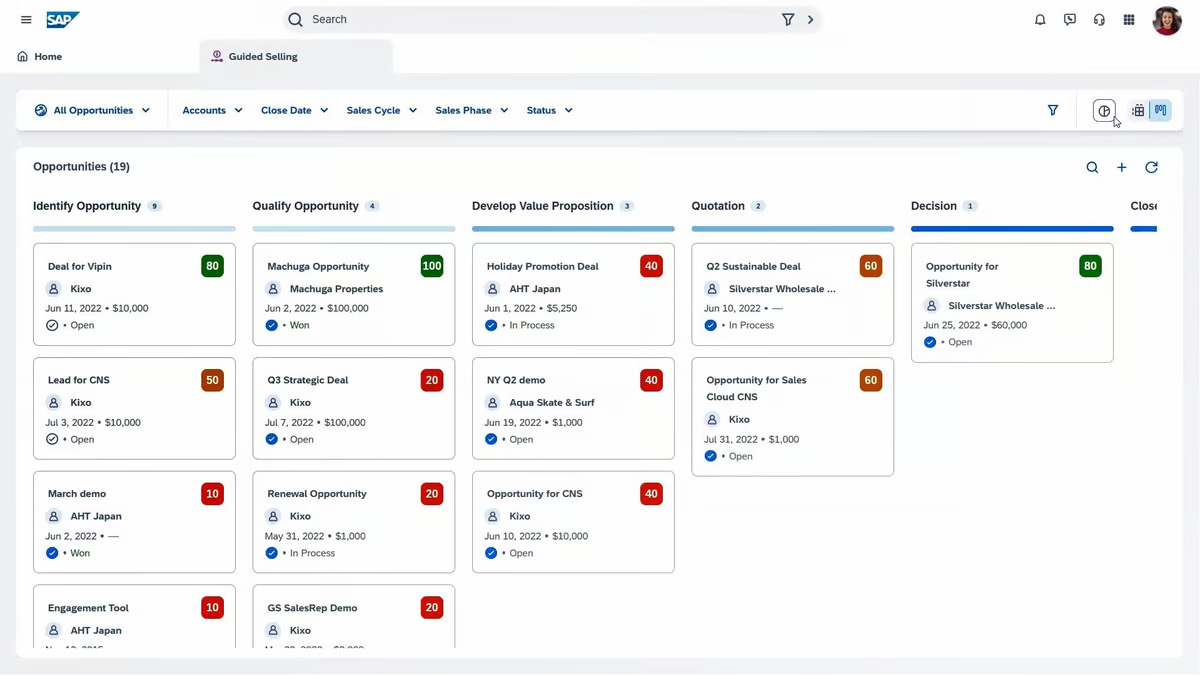
According to G2 user reviews, SAP Sales Cloud is praised for its enterprise-grade capabilities, though implementation is often described as complex. Configuring it to match specific workflows comes with a steep learning curve, and teams typically need extensive training to unlock its full potential.
Another theme in G2 feedback relates to cost and customization. The platform is positioned for larger organizations, making it less accessible for smaller businesses. Reviewers also note that customizing beyond standard modules can take significant effort, and performance may occasionally lag when working with very large datasets.
Overall, G2 sentiment reflects SAP Sales Cloud as a powerful solution for enterprises seeking depth and scalability, even if accessibility, setup, and performance may present challenges.
What I like about SAP Sales Cloud:
- According to users, one standout capability is how SAP Sales Cloud covers the entire sales process, from lead management to territory planning, all in one platform.
- Something G2 reviewers seem to really appreciate is how SAP Sales Cloud integrates seamlessly with other SAP tools like SAP ERP and SAP S/4HANA, providing a unified view of business data.
What G2 users like about SAP Sales Cloud:
“It's very user-friendly and efficient. There are seamless integration options for other products, which makes it the best in its class. It has many features and configuration options, and it releases timely updates and maintenance.
Secondly, when we use it on a daily basis, we need a simple and user-friendly interface offered by SAP. Whenever we have a problem, the support team helps us with a delay, but yes, they are helpful and good.”
- SAP Sales Cloud Review, Tejender K.
What I dislike about SAP Sales Cloud:
- I’ve come across multiple G2 reviews mentioning that setting up SAP Sales Cloud can be challenging, requiring significant time and expertise to align it with team workflows.
- I’ve noticed some G2 reviewers express concern over the pricing, with many finding it steep and tough to justify, particularly for smaller businesses or those with tighter budgets.
What G2 users dislike about SAP Sales Cloud:
“Although it's an all-rounder, it doesn't integrate well with third-party solutions outside its ecosystem. That's its biggest drawback. Other minor drawbacks I've encountered are sometimes slow user support, though rare, and some occasional system issues.”
- SAP Sales Cloud Review, Kayci J.
Want to see how CRM analytics takes your client understanding to the next level? Learn how to use CRM analytics to gain a new perspective on your customers.
7. Pipedrive: Best for visual pipeline management and sales simplicity
I’ve come across a lot of positive feedback about Pipedrive, especially when it comes to ease of use.
Based on 2372+ verified G2 reviews, Pipedrive has been ranked as a category leader on G2, with a stellar customer satisfaction score of 94. It has also achieved an average user adoption rating of 73% and an 8-month estimated ROI payback for the overall segment.
One of its strongest points is its clean, intuitive interface—many teams, including ours, found it easy to get started without needing much training. The visual sales pipelines are a real asset, helping users track deals, activities, and progress in real time, which ultimately speeds up the sales cycle.
Another key advantage is its time-saving automation features. I’ve read that teams appreciate being able to streamline repetitive tasks so they can spend more time actually selling. The pricing is also considered reasonable for small teams or businesses looking for a straightforward CRM without the overhead of a complex setup.
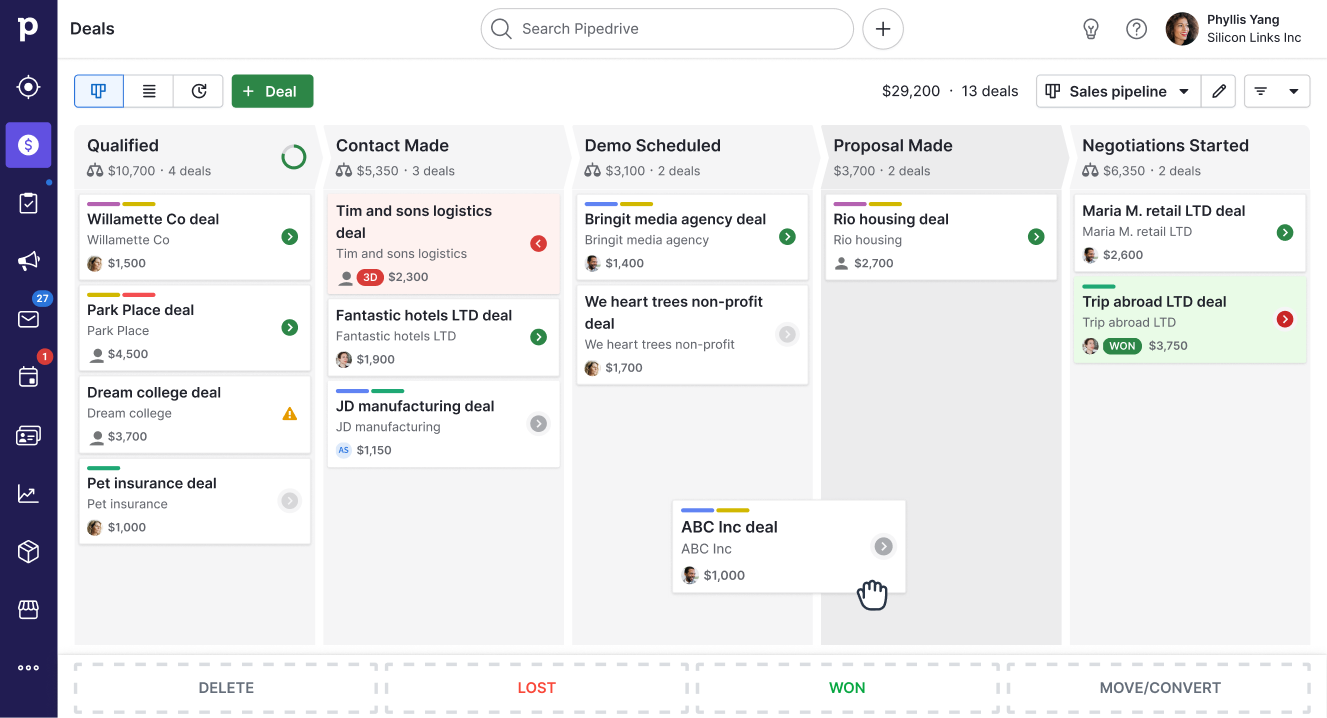
According to G2 user reviews, Pipedrive is praised for its ease of use and pipeline management focus, though it lacks some advanced CRM depth. Automation and email campaign features are seen as fairly basic, and integrations often depend on third-party tools, which can add complexity and cost.
Another theme in G2 feedback relates to stability and reporting. A few reviewers mention occasional bugs with uploads or email deliverability, and while reporting works well for basics, more customizable analytics usually require higher-tier plans. Pricing starts attractively, but costs can rise as businesses expand their feature needs.
Overall, G2 sentiment reflects Pipedrive as a highly accessible CRM for pipeline management, even if advanced automation, integrations, and reporting may leave some teams wanting more.
What I like about Pipedrive:
- Something G2 reviewers seem to really appreciate is the clean and intuitive design, making it easy to navigate and manage sales pipelines, even for new users.
- One feature that I see getting a lot of praise is the visual representation of deals and activities, which simplifies tracking and enhances usability for all users.
What G2 users like about Pipedrive:
“I love Pipedrive's user experience! It's extremely intuitive and easy to use. Also, its email sync and email-sending features from inside the tool are amazing! I used a different CRM before this, but after carefully evaluating Pipedrive during its trial period, I was in love with it! I have also set up several automation features in the tool, which were extremely easy to set up and have made my work easy!
I am using its Lead Form add-on to manage my lead generation and the Projects Add-on to manage my clients and send automated messages to them during different phases of my projects.”
- Pipedrive Review, Anuradha G.
What I dislike about Pipedrive:
- I’ve noticed many G2 reviews mention that Pipedrive lacks robust automation and customizable email campaign tools, which can make it challenging to manage more complex needs.
- I’ve come across noticeable dissatisfaction around how Pipedrive relies on third-party tools for integrations, leading to added complexity and extra costs for users.
What G2 users dislike about Pipedrive:
“The lack of features in the Campaigns app is very frustrating, missing some basic things like ‘view in browser’ page hosting. Certain things about the interface make no sense, like editing email templates, setting up your meeting scheduler, etc. It's all hidden within contact records after many clicks instead of having their dedicated editing pages. With their funding/buy-out by Vista Equity Partners, I am not seeing as many features or updates to the app.”
- Pipedrive Review, Chris L.
8. Bigin by Zoho CRM: Best for affordable, pipeline-centric sales management
I’ve come across Bigin by Zoho CRM as a standout option for teams that value simplicity without compromising on functionality.
Based on 505+ reviews, Bigin by Zoho CRM has earned a customer satisfaction score of 76. Its average user adoption rate is 59%, and its estimated ROI payback is 7 months.
One of the first things I noticed is how easy it is to get started—there’s barely any learning curve. The platform is intuitive, and most users seem to navigate it comfortably without needing to spend much time with documentation or onboarding guides.
The visual pipeline management is another highlight. It offers a clean, straightforward view of the sales stages, making it easy to track deals from initial contact to closure. I found the setup process smooth, and customizing the pipeline to align with our team’s sales flow took just a few minutes.
Bigin’s pricing model is also a major draw. It’s significantly more affordable than many other CRMs I’ve looked into, which makes it especially appealing for small businesses and startups. Despite its low cost, it still includes essential features like contact management, email integration, and basic automation—features that can really streamline daily operations.
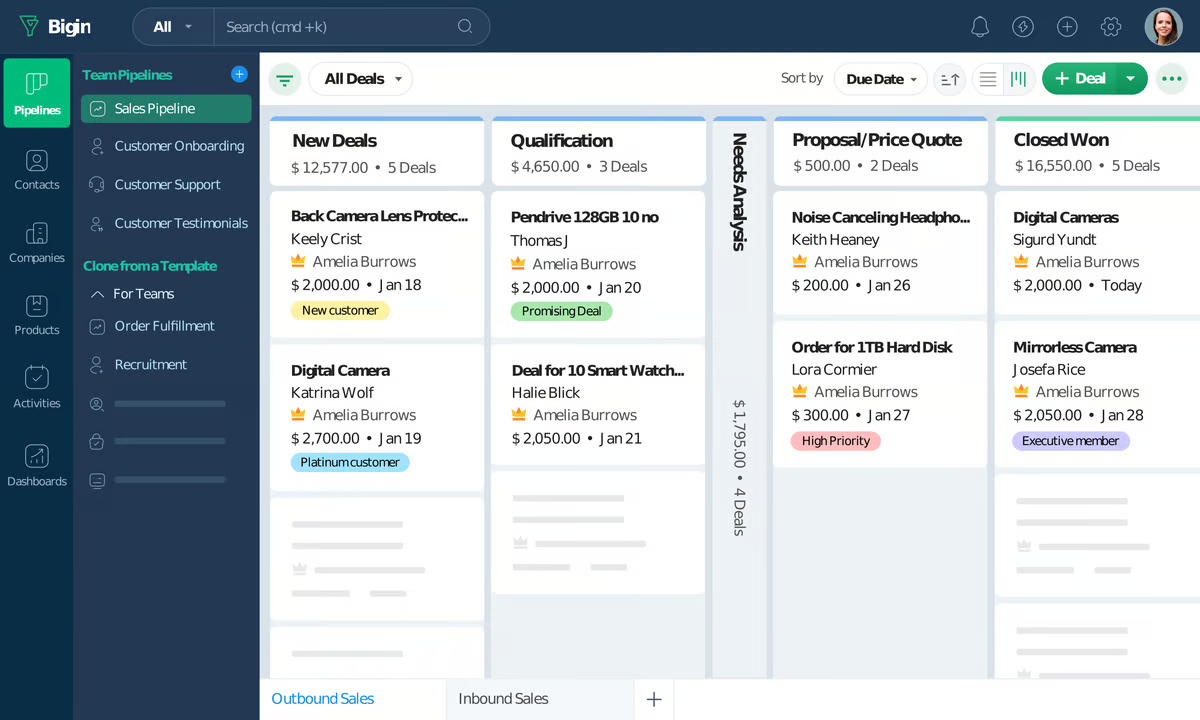
According to G2 user reviews, Bigin by Zoho is appreciated for its simplicity and affordability, though customization is somewhat limited. The number of custom fields is relatively low, which can restrict flexibility, and while email campaigns are helpful, the lack of pre-designed templates means more time spent building from scratch.
Another theme in G2 feedback relates to reporting. The built-in reports handle core metrics well but don’t offer much depth or customization, which may feel limiting for teams that want advanced analytics or deeper performance insights.
Overall, G2 sentiment reflects Bigin by Zoho as a lightweight and user-friendly CRM for smaller businesses, even if customization and reporting options are less advanced than larger platforms.
What I like about Bigin by Zoho CRM:
- One feature that I see getting a lot of praise is the clean, intuitive design, which makes navigation and setup easy for users.
- A commonly appreciated element is the ability to see and track sales stages at a glance, helping users stay organized and on top of their deals.
What G2 users like about Bigin by Zoho CRM:
“The most interesting point of the Bigin CRM is the backbone of the Zoho company. We used Zoho services a few years back and are now back again with their by-product, Bigin. We loved the pricing point of the Bigin CRM for small businesses in education, real estate, and many other domains.
We are into education and loved the simple user interface of the CRM. There was no confusion, and it was very easy to see all the info at once as a report.”
- Bigin by Zoho CRM Review, Santhosh R.
What I dislike about Bigin by Zoho CRM:
- Based on my review of overall user feedback, most users didn’t like the restrictions on adding custom fields, which limited flexibility in customization.
- I’ve noticed some G2 reviewers mention frustration with the lack of pre-designed email templates, as creating templates from scratch added extra work when managing email campaigns.
What G2 users dislike about Bigin by Zoho CRM:
“Browser notifications are missing. The email templates could improve slightly, and the default system notifications can´t be modified. Dashboards do not have a PDF export option. Can´t determine incoming Internet Message Access Protocol (IMAP) messages' dates; it just grabs everything that the inbox connected has.”
- Bigin by Zoho CRM Review, Mario U.
9. Thryv: Best for all-in-one CRM with scheduling and payment tools
I’ve come across several reviews highlighting Thryv as a comprehensive CRM solution that brings scheduling, client communication, and even social media management into one platform.
Based on 229 verified G2 reviews, Thyrv has received a customer satisfaction score of 69. Its average user adoption is 66%, and its estimated ROI payback is 12 months.
This all-in-one approach seems especially valuable for small businesses looking to streamline their operations.
From what I’ve read, users appreciate that Thryv includes practical tools like automated appointment reminders and built-in marketing features. These seem to help many stay organized and nurture client relationships without juggling multiple platforms.
Another recurring theme I’ve noticed is the praise for Thryv’s customer support. Many users mention the reliability of their 24/7 assistance and note that support is easily accessible via chat, phone, or email—something that seems to offer peace of mind when issues arise.
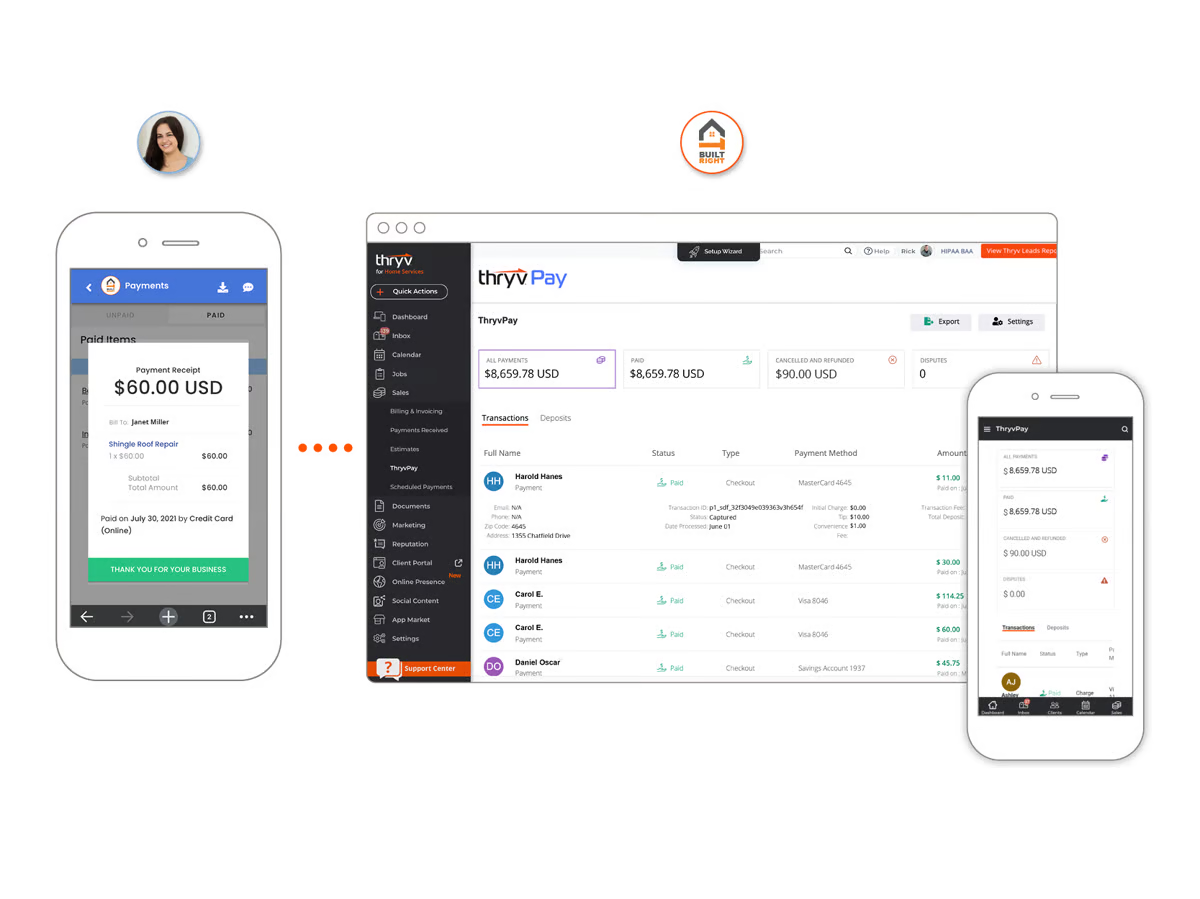
According to G2 user reviews, Thryv is appreciated for its all-in-one business management approach, though some users note a learning curve at the start. Getting fully comfortable with the platform can take time, particularly for those new to integrated business tools.
Another theme in G2 feedback relates to pricing and integrations. A few reviewers feel the cost is higher than comparable solutions, and some mention feature gaps, such as limited support for certain integrations like dialer systems.
Overall, G2 sentiment reflects Thryv as a comprehensive solution for small businesses, with most drawbacks tied to onboarding, pricing, and specific integration needs.
What I like about Thryv:
- I've noticed a consistent theme in G2 reviews: Thryv consolidates scheduling, client communication, and marketing tools into one platform, saving time and simplifying workflows.
- Something G2 reviewers seem to really appreciate is Thryv's customer support. Many mention how quick and responsive the team is when addressing questions or issues.
What G2 users like about Thryv:
“I like that so many features are in the same place – our biggest challenge with using other software before Thryv was the friction of integrating everything. There is minimal integration with other software because the base software offers everything needed. Thryv is easy to apply to our business and set up. We are already using it quite frequently and continue adding more features to our customer service with Thryv's customer support.”
- Thryv Review, Harrison A.
What I dislike about Thryv:
- I’ve come across multiple G2 reviews mentioning that getting familiar with all the features took more time than most users expected, which can be a learning curve.
- I’ve noticed some G2 reviewers express frustration with how Thryv doesn't connect with certain dialer systems that many users rely on, leading to integration challenges.
What G2 users dislike about Thryv:
“While there are areas to include standard business information, webpage, phone number, etc., there are too many instances where the same information is requested in other modules or fields. This is not a significant issue until you change an address or a number. Then, it becomes a challenge to locate each field so it can be edited.”
- Thryv Review, Mike P.
10. Monday CRM: Best for managing sales from prospecting to post-sale
I've noticed that Monday CRM is widely praised for its user-friendly interface and high level of customization.
Based on 899 verified G2 reviews, Monday CRM has a customer satisfaction rating of 73. Its average user adoption rate is 71%, and its estimated ROI payback is 12 months.
The platform's design makes it easy to navigate, even for those without much technical experience. I’ve read that users appreciate how the workflows are visualized clearly, whether through Kanban boards, timelines, or simple lists, making it easier to track progress.
One feature that stands out is its flexibility in customizing workflows for pipeline creation and automating processes. I’ve come across feedback highlighting how users value the integration capabilities with third-party tools like Slack, Google Workspace, and Microsoft Teams, which help streamline work across different platforms.
Another aspect that I’ve found many users appreciate is Monday CRM's ability to foster team collaboration and project management. Shared boards and team updates ensure alignment, and the variety of templates provided allows users to start projects quickly without having to create new templates from scratch.
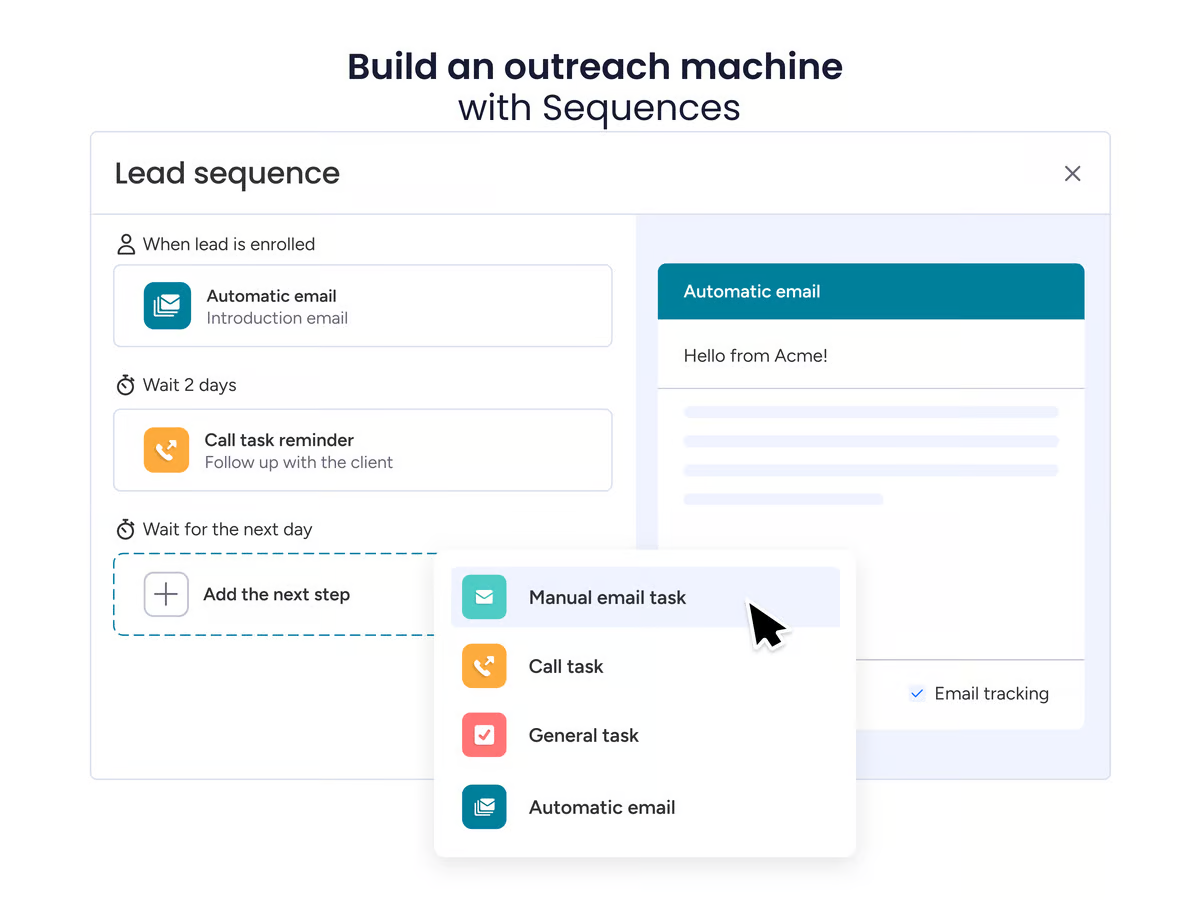
According to G2 user reviews, monday CRM is admired for its flexibility and visual design, though lower-tier plans come with some limitations. Users often mention that advanced tools like time tracking and workload management are restricted to higher plans, which can be frustrating for those hesitant to upgrade.
Another theme in G2 feedback relates to reporting and onboarding. The reporting tools work for basics but lack the depth and customization some teams expect, and new users sometimes find the breadth of features overwhelming at first.
Overall, G2 sentiment reflects monday CRM as a versatile and visually intuitive platform, with most drawbacks linked to plan limitations, reporting depth, and the learning curve.
What I like about Monday CRM:
- One feature that I see getting a lot of praise is the ability to tailor workflows and pipelines to fit specific team needs, which is a significant advantage for many users.
- A commonly appreciated element is the shared boards and team updates, which help teams collaborate seamlessly and stay on the same page.
What G2 users like about Monday CRM:
“The support staff has always been extremely helpful and responsive whenever I've run into an issue. I have created all types of automation for a real estate agent's workflow to take tons of time off her plate. The admin and team permissions make it easy to work in a group, and the integrations make it seamless with Gmail and other tools.”
- Monday CRM Review, Shelby C.
What I dislike about Monday CRM:
- I’ve noticed some G2 reviewers mention that key features, like advanced time tracking, are only available in higher-tier plans, which can be limiting for some users.
- I’ve encountered noticeable dissatisfaction around the reporting options. Many users feel that the available reports are too simple and lack the level of detail and customization they need.
What users dislike:
"I hate that there is no undo button, so if you accidentally remove data or change the wrong line item, it is difficult to get the old information back. My company utilizes mirror columns and connected boards a good bit; I wish that Monday would work on updates for that process to simplify how you make everything connect and work through multiple boards."
- Monday CRM Review, Jody O.
Best CRM Software: Frequently asked questions (FAQs)
Which CRM software is the best?
Salesforce Sales Cloud, HubSpot Sales Hub, and ActiveCampaign consistently rank as top CRM options. They combine customization, automation, and AI-driven insights for scaling sales teams.
What is the easiest CRM to use?
Bigin by Zoho CRM and Pipedrive are known for their simplicity, with visual pipelines and easy onboarding. HubSpot Sales Hub also stands out for its user-friendly design.
Which CRM is best for a small business?
Bigin by Zoho CRM and Pipedrive are ideal for small businesses thanks to affordability and straightforward pipelines. Thryv appeals to SMBs with all-in-one scheduling and payment tools.
What is the best CRM software for startups?
HubSpot Sales Hub and ActiveCampaign offer startups strong automation and email tools at accessible entry points. ClickUp is popular for combining CRM with project management.
What are the common challenges with CRM software?
Steep learning curves, overwhelming feature sets, and change management are typical hurdles. Data accuracy also needs vigilance—periodic cleanup avoids duplicates and outdated entries.
What is the top-rated CRM for mid-size businesses?
Pipedrive and Monday CRM are frequently recommended for mid-size companies. They balance affordability, automation, and reporting with scalable workflows as teams grow.
What is the leading CRM tool for software companies?
Close and HubSpot Sales Hub are strong picks for software companies. They provide built-in calling, email, and automation that streamline SaaS sales cycles.
What CRM is highly recommended for large enterprises?
Salesforce Sales Cloud and SAP Sales Cloud lead for enterprises. They offer advanced AI, automation, and integrations with customer data platforms for global operations.
What’s the best CRM app for small business owners?
Bigin by Zoho CRM is built for small business owners with simple pipelines and low cost. Thryv suits entrepreneurs who need CRM alongside payments and scheduling.
What is the best CRM for a growing tech startup?
ActiveCampaign and ClickUp fit growing tech startups. ActiveCampaign blends marketing automation with CRM, while ClickUp unifies deals, tasks, and collaboration.
What is the best CRM with marketing automation features?
ActiveCampaign and HubSpot Sales Hub are standouts. Both integrate CRM with powerful automation for email campaigns, lead scoring, and segmentation.
What is the best cloud-based CRM for the service industry?
Thryv and Monday CRM are strong choices for service businesses. Thryv adds payments and scheduling; Monday CRM supports client management across the full sales cycle.
What is the most user-friendly CRM for sales teams?
Pipedrive is widely seen as intuitive with drag-and-drop pipelines and activity tracking. HubSpot Sales Hub also offers a clean, approachable experience.
Which CRM works best for e-commerce platforms?
ActiveCampaign supports e-commerce with automation, segmentation, and personalized outreach. Salesforce Sales Cloud scales for omni-channel retail operations.
What is the best comprehensive CRM system for managing customer interactions?
Salesforce Sales Cloud remains the most comprehensive option. It combines AI insights, customizable workflows, and end-to-end integration across marketing, sales, and service.
I’ve explored these CRMs, now it’s your turn.
By taking the time to evaluate what works best for your goals, you’ll find a CRM system that aligns with your vision and empowers your team to work more efficiently. For our team, the right CRM software made a huge difference in streamlining processes, improving communication, and staying on top of customer relationships.
We hope this list of the best CRM providers takes you one step closer to finding the right solution!
Integrate your CRM tools with the best project management software to create smarter workflows.

Sudipto Paul
Sudipto Paul leads the SEO content team at G2 in India. He focuses on shaping SEO content strategies that drive high-intent referral traffic and ensure your brand is front-and-center as LLMs change the way buyers discover software. He also runs Content Strategy Insider, a newsletter where he regularly breaks down his insights on content and search. Want to connect? Say hi to him on LinkedIn.

